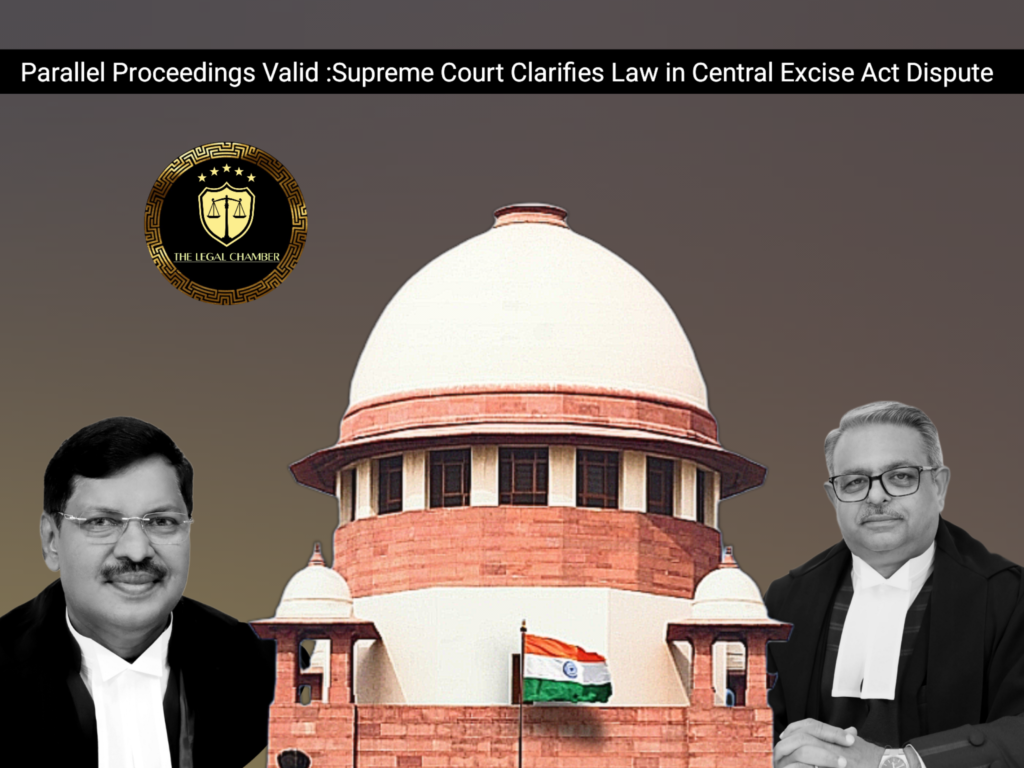
The Supreme Court upheld the continuation of criminal proceedings under Sections 9 and 9AA of the Central Excise Act, 1944, despite the quashing of adjudication orders on procedural grounds. Relying on Radheshyam Kejriwal, it ruled that parallel departmental and criminal proceedings are permissible, and discharge cannot be sought merely due to pending adjudication. The Court emphasized that prima facie evidence in the complaint justified the trial, rejecting technical objections under CrPC Section 245(2). It clarified that remand for de novo adjudication does not equate to exoneration on merits, ensuring criminal liability remains independent of administrative outcomes.
Facts Of The Case:
The case involved M/s Rimjhim Ispat Limited, M/s Juhi Alloys Limited, and Yogesh Aggarwal (Appellants) facing criminal prosecution under Sections 9 and 9AA of the Central Excise Act, 1944, for alleged clandestine manufacture, illicit removal of goods, and excise duty evasion during 2006-07. The Directorate General of Central Excise Intelligence (DGCEI) conducted a search in November 2007, leading to two Show Cause Notices (SCNs)—one for duty evasion (2008) and another imposing penalties on directors (2009). While the first SCN was dropped, the second SCN resulted in a demand of ₹6.68 crore and a ₹25 lakh penalty on Aggarwal. The CESTAT later remanded the case for de novo adjudication on procedural grounds, without addressing merits.Meanwhile, the DGCEI initiated criminal proceedings (2013), relying on the initial adjudication order (2011), which the Appellants argued was invalid after remand. They sought discharge, claiming the complaint lacked legal basis after the High Court quashed subsequent adjudication orders (2015, 2017) due to procedural lapses. However, the Supreme Court upheld the criminal trial, ruling that pending adjudication does not bar prosecution and prima facie evidence justified continuation. The Court dismissed the appeal, affirming that criminal liability stands independently of departmental proceedings.
Procedural History:
The procedural history of the case began with the Special Chief Judicial Magistrate, Kanpur Nagar, issuing summons in 2014 based on a complaint under Sections 9 and 9AA of the Central Excise Act, 1944. The appellants filed a discharge application, which was rejected by the Trial Court in 2015, holding that adjudication and criminal proceedings operate independently. They then approached the Allahabad High Court under Section 482 CrPC, seeking quashing of proceedings, but the High Court dismissed their revision petition in 2016, relying on Radheshyam Kejriwal to affirm that criminal prosecution could proceed despite pending adjudication.The appellants subsequently moved the Supreme Court via Special Leave Petition (2016), contending that the criminal complaint was based on a quashed adjudication order and lacked merit. However, the Supreme Court, in its 2025 judgment, upheld the High Court’s decision, clarifying that remand for fresh adjudication did not invalidate the criminal case and that prima facie evidence justified trial. The Court emphasized that procedural lapses in departmental proceedings do not automatically nullify criminal liability, thereby allowing the prosecution to continue.
READ ALSO :Supreme Court Verdict on Cross-Border Taxation: Hyatt’s India Operations Fall Under PE, Income Taxable
Court Observation:
The Supreme Court made several key observations while dismissing the appeal. It held that criminal proceedings under the Central Excise Act can proceed independently of departmental adjudication, even if the latter is remanded or set aside on procedural grounds. Relying on Radheshyam Kejriwal, the Court clarified that parallel proceedings are permissible, and discharge cannot be sought merely because adjudication remains pending.The Bench emphasized that the complaint contained prima facie evidence of excise duty evasion, justifying the continuation of the criminal trial. It rejected the appellants’ argument that the quashing of adjudication orders (2011, 2015, and 2017) invalidated the prosecution, noting that remand for de novo consideration does not equate to exoneration on merits. The Court also dismissed technical objections under Section 245(2) CrPC, stating that subsequent evidence could be considered at the trial stage.Additionally, the judgment affirmed that Article 21 was not violated, as the proceedings followed established legal procedure. It distinguished the case from precedents cited by the appellants, ruling that criminal liability survives independently even if departmental penalties are stayed or reconsidered. The Court ultimately upheld the High Court’s dismissal of the revision petition, allowing the criminal trial to proceed.
Final Decision & Judgement:
The Supreme Court dismissed the criminal appeal, upholding the Allahabad High Court’s 2016 judgment that had allowed the prosecution to continue under Sections 9 and 9AA of the Central Excise Act, 1944. The Bench, comprising CJI B.R. Gavai and Justice Augustine George Masih, ruled that the criminal proceedings were valid despite the remand and subsequent quashing of adjudication orders in departmental proceedings. The Court held that the complaint contained sufficient prima facie evidence of excise duty evasion, and the Trial Court rightly rejected the discharge application under Section 245(2) CrPC.Reaffirming the principle laid down in Radheshyam Kejriwal, the judgment clarified that adjudication and criminal trials operate independently, and the outcome of one does not dictate the other. The Court emphasized that procedural lapses or remand in departmental proceedings do not automatically nullify criminal liability, especially when the allegations involve willful evasion of excise duty. The appeal was dismissed with a clarification that the observations were limited to the criminal proceedings and would not influence pending adjudication. No costs were awarded, and all pending applications, if any, stood disposed of. The judgment reinforces the strict enforcement of fiscal laws while upholding the autonomy of criminal prosecution in economic offences.
Case Details:
Case Title : M/s Rimjhim Ispat Limited & Others vs. Union of India & Another Citation : 2025 INSC 901 Criminal Appeal No.:Criminal Appeal No. 268 of 2017 Date of Judgment:July 24, 2025 Bench/Justices: Justice B.R. Gavai & Justice Augustine George Masih
Download The Judgement Here